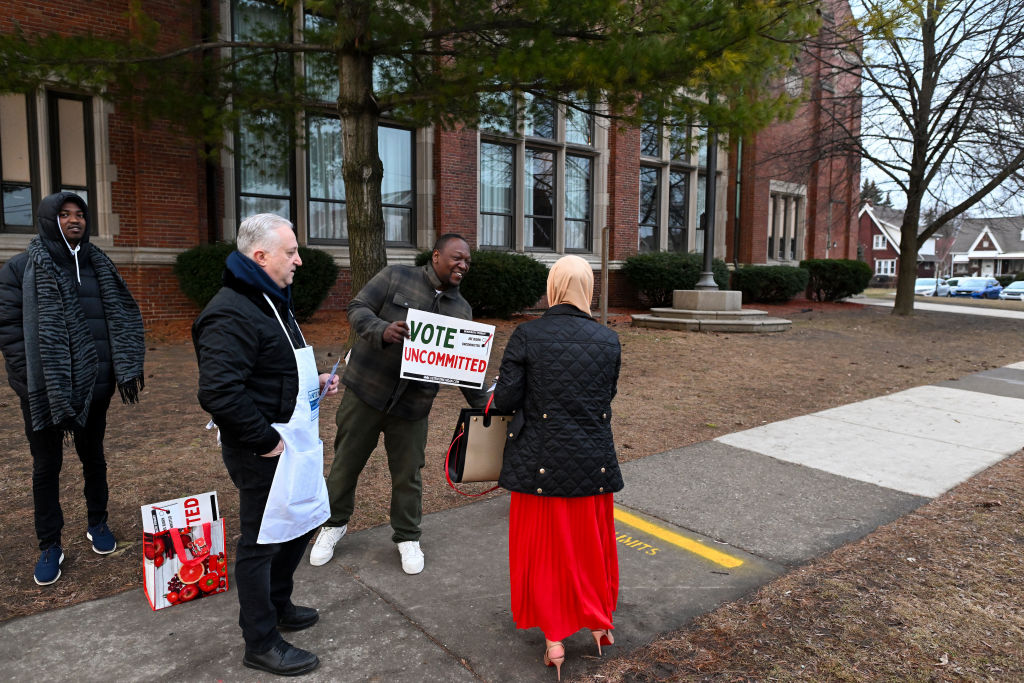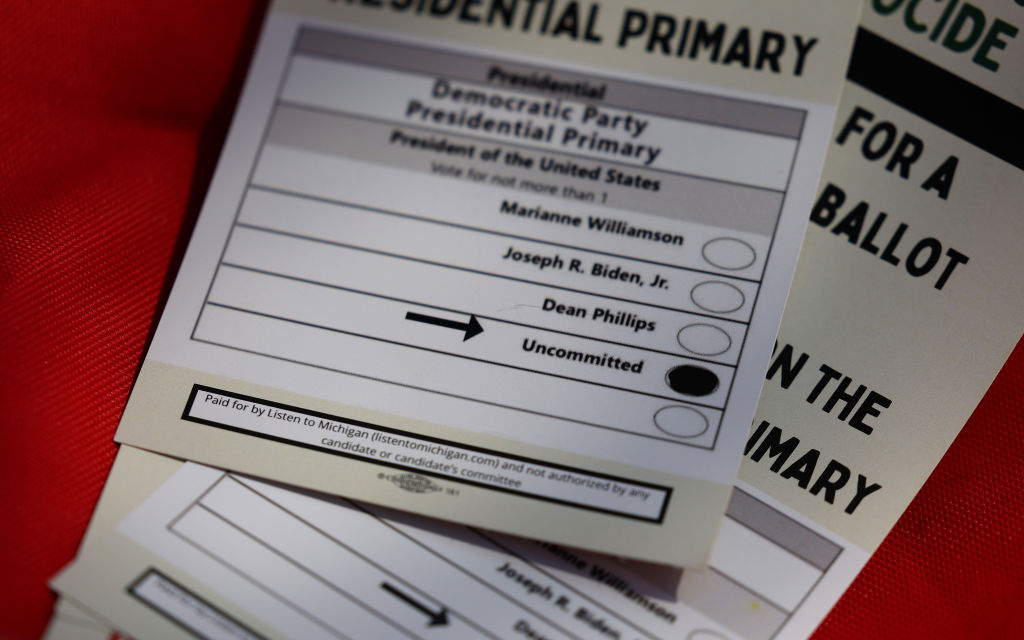What The Michigan Primary’s ‘Uncommitted’ Voting Protest Means For The General Election

Jamel Ridgenal (second from right) with New Virgina Majority tells Anjy Wehbe (red dress) to “vote uncommitted” outside a polling station inside McDonald Elementary School on Tuesday, February 27, 2024, in Dearborn, Michigan. | Source: The Washington Post / Getty
Joe Biden won the 2024 Michigan Democratic primary, but “uncommitted” ran a spirited campaign.
More than 100,000 Michiganders voted “uncommitted” in Tuesday’s Democratic primary, 13% of the Democratic electorate.
MORE: Gov. Wes Moore Warns Black Voters Of Trump’s Divisive Rhetoric
Listen to Michigan organized the uncommitted campaign in Michigan, promoting it as a way to express dissatisfaction with the Biden administration’s public stance in support of Israel’s actions in its conflict with Hamas in Gaza.
The group also set a goal of securing more uncommitted votes than the 11,000-vote margin by which Donald Trump defeated Hillary Clinton in 2016. The total was nearly 10 times that number.
Biden won Michigan in 2020 by 154,181 votes.
While there were no exit polls conducted with Michigan primary voters, preelection polling just before the primary showed Biden’s weakness among potential young voters as well as Arab Americans.
Michigan has the largest Arab, Muslim and Palestinian population in the United States, currently numbering more than 200,000.
More than half of the population of Dearborn, Michigan, is Arab, as is its mayor; it is home to the largest mosque in the United States. One of the leaders of the uncommitted movement is U.S. Rep. Rashida Tlaib from the 12th District, the first Palestinian American woman elected to Congress.
At time of publication, with 98% of precincts reporting a day after the election, vote tallies from Dearborn, the city with the highest percentage of Arab American voters in the state, show “uncommited” leading there – 6,290 votes to President Biden’s 4,517.

A flier calling for a ceasefire in Gaza is seen outside of a polling location at Maples Elementary School on February 27, 2024, in Dearborn, Michigan. | Source: Kevin Dietsch / Getty
It’s not clear that all of the uncommitted voters were part of the protest. In primaries, some voters will vote uncommitted if they have not yet made their choice or don’t want to disclose that choice for any number of reasons. In 2020, 19,106 Democratic voters in Michigan selected uncommitted, while 21,601 did so in 2016 – even though no protest was attached to those decisions.
What makes the 2024 primaries different from previous contests is that uncommitted voters are being reported in exit polls and by election officials because that designation actually appears on the ballot in some states.
Besides Michigan, which added uncommitted to its primary ballots in 2012, there are uncommitted lines on the ballots in New Hampshire, North Carolina and South Carolina; Florida has a “no preference” line. In Oregon and Washington, citizens will be able to vote for an uncommitted delegate to the convention.
Selecting uncommitted is a way for voters to express dissatisfaction with the candidates whose names appear on the ballot while still participating in the democratic act of voting.
In my view, this form of peaceful protest is an essential element of American democracy and more demonstrative than staying home from the polls.
It is not an option for the fall general election, where the only alternative to a Biden vote for Democrats will be to stay home or vote for Donald Trump.
Given his past record and proposals to exclude Arabs from immigration to the United States, I don’t believe that will be a realistic alternative for many of Michigan’s uncommitted voters.
Michael Traugott, Research Professor at the Center for Political Studies, University of Michigan
This article is republished from The Conversation under a Creative Commons license. Read the original article.
![]()
SEE ALSO:
Republicans Are Counting On Racist Stereotypes To Attract Black Voters For Trump
The post What The Michigan Primary’s ‘Uncommitted’ Voting Protest Means For The General Election appeared first on NewsOne.





